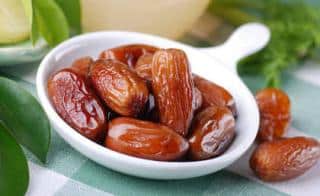The Date is the fruit born by the date palm (Phoenix dactylifera), an exotic plant native to North Africa and Egypt, a tree that belongs to the Arecaceae family (palm trees). Loaded with vitamins and nutrients, date shares many health benefits that are great for the body.
Health benefits of dates for the body
- Stock-full of carbohydrates, date is an energy-loaded fruit that is recommended for athletes (since it supports muscular activity), children and persons recovering from operations.
- Dates contain high levels of potassium, iron and magnesium.
- Fresh dates contain an elevated proportion of antioxidants that protect body cells from damage caused by free radicals. When dried, levels drop a bit because some amounts are lost during dehydration.
- A lot of insoluble fiber can be found in dates that enhance intestinal transit and prevent constipation, as well as soluble fiber which play a part in reducing cholesterol levels and regulating glucose and insulin levels. Consequently, they can reduce incidence of cardio-vascular diseases.
- On par with figs, jujube and dried raisins, dates are one of the ingredients of “chest herbal tea”, a preparation that is recommended to soothe sore throat.
Growing date palm for its health benefits
- Date palm requires warm exposure, no lower than 40°F (5°C) and in full sun. Soil must be sandy, deep, cool, humus-rich and drained.
- In a pot, a large garden box, or any container larger than 12 inches (30 cm) across and deep, you can start growing date palm. It’s a very ornamental plant, but will remain dwarf-sized and won’t bear fruit. Also, take care to bring your pot under shelter away from winter lows, but also in case of very high temperatures.
- Palm trees abhor scale insects and don’t like bayoud, which is a mushroom that leads to leaves losing their color, ultimately resulting in the death of the tree.
Date palm and cooking, how to retain health benefits
 Dates can be savored both fresh or dried. Dried dates can be eaten as is, but feel free to rinse extra sugar syrup off, usually they’re drenched with it to ensure they stay moist during transportation. If they were packaged dry, simply soak them in water for a few hours to rehydrate them.
Dates can be savored both fresh or dried. Dried dates can be eaten as is, but feel free to rinse extra sugar syrup off, usually they’re drenched with it to ensure they stay moist during transportation. If they were packaged dry, simply soak them in water for a few hours to rehydrate them.
Dates pair wonderfully with spices: mix them in to preparations that already include cinnamon, cumin, ginger or cardamom. When baked with poultry, pork and lamb, they’ll lend a salty-sweet touch to your meals.
Nutritional content of dates
120 kcal / 3.5 oz (100 g) for fresh dates and 280 kcal / 3.5 oz (100 g) for dried ones. Dates contain high levels of vitamin B, fiber and minerals.
Image credits (edits Gaspard Lorthiois):
adobestock: Dionisvera, Al62


 Dates can be savored both fresh or dried. Dried dates can be eaten as is, but feel free to rinse extra sugar syrup off, usually they’re drenched with it to ensure they stay moist during transportation. If they were packaged dry, simply soak them in water for a few hours to rehydrate them.
Dates can be savored both fresh or dried. Dried dates can be eaten as is, but feel free to rinse extra sugar syrup off, usually they’re drenched with it to ensure they stay moist during transportation. If they were packaged dry, simply soak them in water for a few hours to rehydrate them.